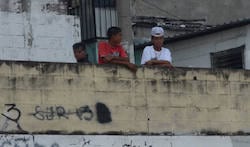In a concerning development for press freedom in El Salvador, a top police official has called for the investigation of newspaper El Diario de Hoy on terrorism-related charges in response to a series of articles on the country’s street gangs.
In a letter to El Salvador’s Attorney General’s Office (Fiscalía General de la República, – FGR), head of police investigations Joaquín Hernández urged Salvadoran newspaper El Diario de Hoy be investigated for being “apologists of terrorist acts,” reported La Pagina. (See below)

Hernández’s accusations arise in response to a series of articles El Diario de Hoy published in December 2015 on El Salvador’s street gangs.
One of the articles, titled “Gangs Control San Salvador,” portrays El Salvador’s capital-city as a gang-controlled battleground, and includes both a video and map detailing gang territory in the city. (See below) In another, “A Clique Controls the San Jacinto Neighborhood,” El Diario writes, “The police do not escape gang control. In fact, they may be the most controlled.”
In his letter to the FGR, Hernández calls the El Diario articles inaccurate, saying they give the impression “the capital is totally controlled by these criminal groups,” and do not recognize the work of the FGR and police towards “preventing and repressing crime.” This, Hernández argues, “magnifies” the gangs’ presence in these areas, provoking “fear and terror” among the population, “which already lives terrorized by crime.”
InSight Crime Analysis
Hernández’s accusations against El Diario de Hoy follow an August 2015 decision by the Salvadoran Supreme Court to reclassify the Barrio 18 and MS13 as terrorist organizations, which the court held the gangs deserved for their systematic and organized used of violence.
Yet, in addition to gang members, the court’s ruling categorized gang “collaborators, apologists, and financiers” as terrorists. It appears as if Hernández is suggesting El Diaro de Hoy falls into this category as a result of their reporting on gangs. Under El Salvador’s terrorism law (pdf), those convicted of such a crime may face up to 10 years in prison.
SEE ALSO: El Salvador News and Profiles
To be sure, Hernández is entitled to dispute the newspaper’s coverage of the country’s street gangs. But calling for an investigation of El Diario de Hoy under the country’s terrorism laws is something different altogether, and raises concerns the laws may be abused by government officials to censor any press coverage or critiques of the country’s deteriorating security situation deemed unfavorable.

